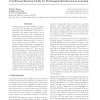Free Online Productivity Tools
i2Speak
i2Symbol
i2OCR
iTex2Img
iWeb2Print
iWeb2Shot
i2Type
iPdf2Split
iPdf2Merge
i2Bopomofo
i2Arabic
i2Style
i2Image
i2PDF
iLatex2Rtf
Sci2ools
126
click to vote
ICML
2007
IEEE
2007
IEEE
Conditional random fields for multi-agent reinforcement learning
Conditional random fields (CRFs) are graphical models for modeling the probability of labels given the observations. They have traditionally been trained with using a set of observation and label pairs. Underlying all CRFs is the assumption that, conditioned on the training data, the labels are independent and identically distributed (iid). In this paper we explore the use of CRFs in a class of temporal learning algorithms, namely policygradient reinforcement learning (RL). Now the labels are no longer iid. They are actions that update the environment and affect the next observation. From an RL point of view, CRFs provide a natural way to model joint actions in a decentralized Markov decision process. They define how agents can communicate with each other to choose the optimal joint action. Our experiments include a synthetic network alignment problem, a distributed sensor network, and road traffic control; clearly outperforming RL methods which do not model the proper joint policy.
Related Content
| Added | 17 Nov 2009 |
| Updated | 17 Nov 2009 |
| Type | Conference |
| Year | 2007 |
| Where | ICML |
| Authors | Xinhua Zhang, Douglas Aberdeen, S. V. N. Vishwanathan |
Comments (0)

